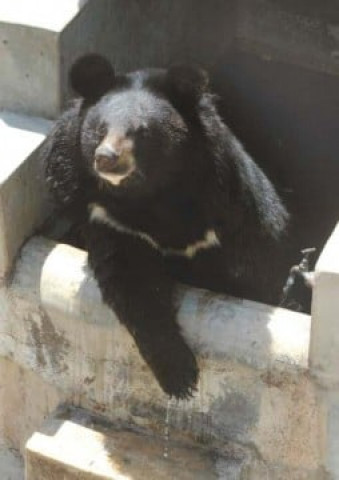Rescued bear becomes a beacon of ‘hope’
A victim of bear-baiting, Hope, who lost three limbs, has learned to use a cycle to move about

All hope is not lost, was the thought that came to the minds of many a wildlife enthusiast when they saw the video of a disabled bear moving about with the support of a hand-made cycle.
The video, shared by the Sindh Wildlife Department (SWD), in fact, literally showed 'Hope' - the bear that lost three limbs to the infamous practice of bear-baiting.
Following the tragedy, Hope was sold to a gypsy family in Punjab. They took the bear to Karachi, where they would drag it along the city’s crowded, polluted and dirt-ridden roads all day in an attempt to beg for money.
Hope became an epitome of misery, poverty and suffering - much in contrast to its name - as the gypsies hauled it from street to street in the scorching heat, trying to present an image distressing and moving enough to convince people to give them money.
This tribulation finally came to an end when the SWD conducted a raid in Lyari last year and rescued Hope. The bear was then sent to the National Bear Rehabilitation Sanctuary in Chakwal district near Islamabad, where it recuperated and was finally able to move about with the aid of a cycle.
Enthusing over Hope's recovery, SWD conservator Javed Ahmed Mahar commented, "It has a permanent disability, but has fortunately survived and is able to move. Hope has given new hope to us."
A cruel game
Though Hope was lucky enough to survive the onslaught of bear-baiting and ensuing adversities, numerous innocent animals have fallen prey to the deadly sport that has killed many of them.
In bear-baiting, as the name of the game gives away, a bear is used as bait in a fight against dogs, while spectators cheer and hoot at the gory combat. The practice, dating back to the colonial era, finds its roots in the country's rural areas.
Mudassir, a wildlife conservator, told The Express Tribune that Gujranwala was once considered the hub of bear-baiting. Besides, the game is also widely popular in Sargodha, Dera Ghazi Khan, Bahawalpur and Multan in Punjab, as well as Khairpur, Naushero Feroze, Tando Allahyar, Sanghar and some other districts of Sindh.
He explained that bear cubs between the ages of two to four months are captured and trained for bear-baiting in different parts of Pakistan, Mirpur in Azad Kashmir being particularly famous for it.
According to him, three kinds of bears are trained, traded and used for bear-baiting in Pakistan - the brown bear, black bear and Balochistan bear. "But only three such bears are now left in Sindh, with two in the possession of landlords and one with a gypsy tribe.”
The end is nigh?
Once widely popular across Pakistan, few incidents of bear-baiting have been reported in the recent past.
According to Mudassir, no occurrence of the sport has been reported in Sindh for over a year, despite it being a common activity in rural areas some years back.
This may be due to a blanket ban on the sport put in place in 2015, when the SWD made a sweeping move to forbid many torturous practices, including animal fighting and forced begging with animals.
In a notification at the time, the SWD declared that anyone found involved in these acts would be fined Rs100,000 or jailed for two years.
"After the ban, some have stopped playing animal sports [in Sindh]," said Mudassir, adding, however, that some incidents of bear-baiting were still being reported in Punjab.
Mahar, on the other hand, claimed it was no longer happening anywhere, pledging that the department would soon trace the remaining affected bears in the province and send them to rehabilitation centres too.
In this regard, the SWD has even announced compensation for bear owners who handed the animals over to the authorities.
"If anyone uses bears as a source of earning, we will offer them an alternative [means of income]," the SWD chief said. "We want to see Sindh free from bear-baiting and bring this cruel game to an end once and for all."
Published in The Express Tribune, August 22nd, 2020.



















COMMENTS
Comments are moderated and generally will be posted if they are on-topic and not abusive.
For more information, please see our Comments FAQ